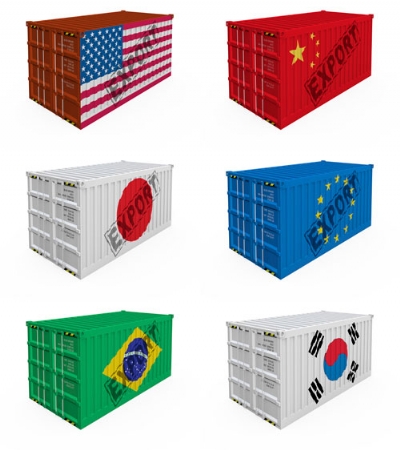Most companies partner with consolidators(also known as Export Management Companies)
to source incremental business from tough to reach geographies. Consolidators are local companies that groups different products from one country into one container. The consolidator then sells to a list of customers that may include distributors and retailers. Consolidator business is typically easier to handle, as you ship existing packages to a warehouse in your home country and receive payment in local currency. This practice generally functions well, but you must balance additional shipments with “loss of control” and “diverting risk”. Below are Export Solutions “Ten Tips” for building your business through consolidators.
1. Use Consolidators !
Consolidators represent an efficient route to market for new exporters, niche brands , or for hard to access regions such as the Middle East
2. Fee Structure
Consolidators need to make money too ! Normally, there fee is built into a cost calculation to the retailer or offshore distributor. 10 % is an average consolidator margin, but there are many variables. Note that the consolidator margin plus an extra logistics stop while ultimately drive your price 15 % higher to the consumer than a “direct to distributor” model.
3. Avoid Region Wide Appointments
Consolidators serve as options for islands in the Caribbean or small countries in the Middle East. However, you should rarely give them responsibility for bigger markets like Puerto Rico or Saudi Arabia.
Better to deal direct to distributor and use cost differential to invest in brand building or lower retail prices.
4. Pricing
Typical pricing to consolidators is around 90 % of standard list price. This will provide a discount to compensate for promotion pricing activity, but not a wide enough gap to risk diverting. Good consolidator partners will share a transparent price calculation model from factory gate to overseas store shelves.
5. Which Distributors form the Consolidators Customer Network ?
Part of your assessment process will be to analyze distributors used by a consolidator. You need to decide if the consolidators typical partners are a good fit with your brand representation requirements. Note: some consolidators “guard” their distributor lists. However, understanding their customers is a critical step in assessing their capabilities.
6. Reference Check New Consolidators
It is a standard practice to reference check consolidators. Many will accurately claim representation of famous brands. However, the scope of partnership may actually be quite limited. Ask references about years of partnership, results, and countries/brands in the consolidator coverage agreement.
7. Mark Packages “For Export Only”
Diverting discussions are significant distractions for most export managers. Consolidators may be tempted to divert , as they typically purchase standard packages and receive delivery in the home country. Labeling packages “For Export Only” or even “Export” diminish the likelihood that your brand will be diverted and reduce complaints and accusations from your national sales team.
8.Beware of Local Laws
Consolidators are an integrated solution, which eliminates measurable paperwork and stress from an export program. However, this does not release the brand owner from obligations to comply with local laws on labeling and distributor contracts. Naturally, you should also maintain a contract with your consolidator to guide terms and conditions of your relationship.
9. Request Listing Maps
A frequent complaint is that manufacturer’s loss control of their export business when dealing with a consolidator. Brands receive market level shipment reports at best,with limited or no data on listings by retailer, pricing, or merchandising activity. Request that consolidator provide a “Listing Map”, by country at least twice per year.
10. Periodic Visits to Consolidator Territory
Export managers should conduct market visits to leading countries managed by the consolidator.
Check stores, meet with distributors, understand growth opportunities. These programmed visits are likely to be positive, but send a signal to the consolidator that you are an active partner.


